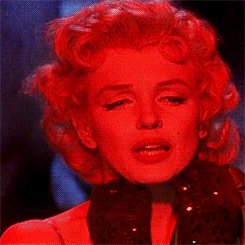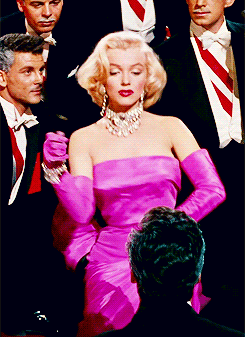Marilyn & George Axelrod
Arrêt d'Autobus
Les interviews
Marilyn Monroe et George Axelrod, responsable du script du film Bus Stop, ici en plein tournage.
Entretien avec George Axelrod (co-script sur The Seven Year Itch et script sur Bus Stop)
extraits du livre Backstory 3 - Interviews with screenwriters of the 1960s - Pat McGilligan - University of California Press - 1997
[p.63] (...) Okay, self-serving. In the case of Bus Stop, I believe the movie of Bus Stop is a better movie than the play of Bus Stop is a play. Because Bus Stop is not a particularly good play of Bill Inge's, but it had two unforgettable characters—the chanteuse and the cowboy.
The play just plays in one set, at the bus stop, and I had to open it up. I had a brilliant scene in the screenplay for Bus Stop, which the Breen Office just murdered. In the play, the cowboy is bragging about how literate he is—that he can recite the Gettysburg Address. In the movie, I had him break into the girl's room in the morning, while she is asleep, just to prove how literate he is. As he's screwing her, he is reciting the Gettysburg Address. It went on and on: "We are met on a great battlefield . . . " The longer it went on, the funnier it was, but he has to be screwing her while he's doing it. Hilarious scene. But, of course, the Breen Office didn't allow them to screw. So it was a botch.
Whatever deluded you into writing it?
Perversity. I hoped Josh [Logan] would figure some way to make it work—film it on their faces, or something.
Were you hoping for a breakthrough in the Production Code?
The breakthroughs weren't anywhere near. Years later, with Lord Love a Duck, they still hadn't broken through. The last scene, where Roddy [McDowall] goes off triumphantly, screaming? I had him mouth "Fuck you!" and they cut it out.
Did these things drive you crazy?
Oh, mad. Not only did I have to cope with the Breen Office, but I had the Legion of Decency. Frank McCarthy, who was in charge of getting stuff through the Legion of Decency at 20th, used to say, "George, for Chrisake, why do you fight the system? Monsignor Biddle"—who was the movie guy for the Legion of Decency—"will be more than happy to sit down and write the scene with you . . . " (Laughs. Long pause.)
Irony?
Irony! The fact is that I would not sit down with Monsignor Biddle to write sex comedy scenes.
Then, unfortunately, after you wrote them, he went ahead and rewrote them.
Yeah, he just blue-penciled them out.
You told me that Itch was inspired by a real person. How often do you do that—take dialogue from real people?
I do listen to people. Almost all my original stuff is based on a real person; most, loosely. Almost everything starts with a person. Something about that person which gets me thinking—and, mostly, it's a woman.
[p.64/65] Why?
I don't know why. A lot of stuff was written for Marilyn. I had a big, professional, emotional hang-up with Marilyn.
When did you meet Marilyn?
When I first came out and started working with Billy in '53. She was rehearsing a musical at 20th—I remember she was doing a dance routine with [the choreographer] Jack Cole on a hot, sweaty soundstage in grungy rehearsal clothes, all covered with sweat, and she was just edible—glorious.
Poor Marilyn. I did two pictures with her and got to know her pretty well. She was a sad, sad, sad creature. She was sick. In a rightly ordered world, she would have been in a nuthouse. She was psychotic. Once you got to know her, one couldn't feel sexy about her. She was pathetic, sad. You just wanted to comfort her, cuddle her, father her, say, "It's going to be all right, child."
Did she ever involve herself, critically or otherwise, in the process of writing?
No.
Did she make script suggestions?
Not that I ever heard.
She would read the lines as written?
If she could remember them, and she couldn't.
If she couldn't, then she might do some interpolation?
No. She'd burst into tears and run off. The scene on the bus in Bus Stop, where she's pouring her heart out to Hope Lange, was a nightmare to shoot. "Rear projection" wasn't as good as it is now, so they kept running out of film. We had this rickety insert of a bus, and a rear projection screen, and Hope and Marilyn with a big, long speech, and Marilyn couldn't remember the words. Josh's dialogue director was propped up just outside of the screen, feeding her the lines, which she would parrot back. She had reached a point in her neurosis where if anybody said, "Cut!" she took it as an affront, burst into tears, and ran into her dressing room. So Josh never said cut. He'd run the whole nine hundred feet, keep running it and running it while he talked to her.
He was a huge man. Josh, so most of the time the screen was filled with Josh's behind and Marilyn's face, with this voice coming from the sky reading the lines that Marilyn would parrot. It took four days to shoot this scene, but it cut together like a dream, partly because Hope Lange is a professional actress and we'd cut to her. Little pieces of what Marilyn would do were inspired, magical, but interspersed with tears and "oh, shit!" and "what the fuck!" and getting her back together—all of it with the camera running because you couldn't say cut. God, the goings-on!
>> source web interview & photo:
livre en ligne sur backstory 3 descendre jusque page 45, page 64.

/image%2F1211268%2F20240315%2Fob_782fd3_banner-mm-2024-03-spring-5.jpg)
/image%2F1211268%2F20240410%2Fob_40c4f9_blog-gif-mm-niagara-1-3.gif)

/image%2F1211268%2F20240417%2Fob_0b0d56_2024-03-lee-mexique.jpg)
/https%3A%2F%2Fstorage.canalblog.com%2F19%2F65%2F312561%2F91436129_o.jpg)
/https%3A%2F%2Fstorage.canalblog.com%2F57%2F63%2F312561%2F127743382_o.jpg)
/https%3A%2F%2Fstorage.canalblog.com%2F98%2F05%2F312561%2F84823731_o.jpg)
/https%3A%2F%2Fstorage.canalblog.com%2F01%2F63%2F312561%2F84814201_o.jpg)
/https%3A%2F%2Fstorage.canalblog.com%2F66%2F21%2F312561%2F82823948_o.jpg)
/https%3A%2F%2Fstorage.canalblog.com%2F32%2F31%2F312561%2F124125043_o.jpg)
/https%3A%2F%2Fstorage.canalblog.com%2F31%2F08%2F312561%2F71448014_o.jpg)
/https%3A%2F%2Fstorage.canalblog.com%2F34%2F90%2F312561%2F81829009_o.jpg)
/https%3A%2F%2Fstorage.canalblog.com%2F18%2F35%2F312561%2F61120383_o.jpg)
/image%2F1211268%2F20240410%2Fob_9f471d_blog-gif-mm-syi-1.gif)


/http%3A%2F%2Fstorage.canalblog.com%2F48%2F91%2F312561%2F134471345_o.jpg)
/http%3A%2F%2Fstorage.canalblog.com%2F24%2F96%2F312561%2F133105670_o.jpg)
/http%3A%2F%2Fstorage.canalblog.com%2F30%2F92%2F312561%2F132263840_o.jpg)

/image%2F1211268%2F20240229%2Fob_66f2c6_tag-mm-public-martin-lewis-show-1.png)
/image%2F1211268%2F20240410%2Fob_07cb4a_blog-gif-mm-stern-1.gif)
/image%2F1211268%2F20240229%2Fob_143453_blog-gif-video.gif)
/image%2F1211268%2F20240301%2Fob_735dec_blog-liens-culture.jpg)

/image%2F1211268%2F20240302%2Fob_e11252_blog-liens-friends-jane.gif)